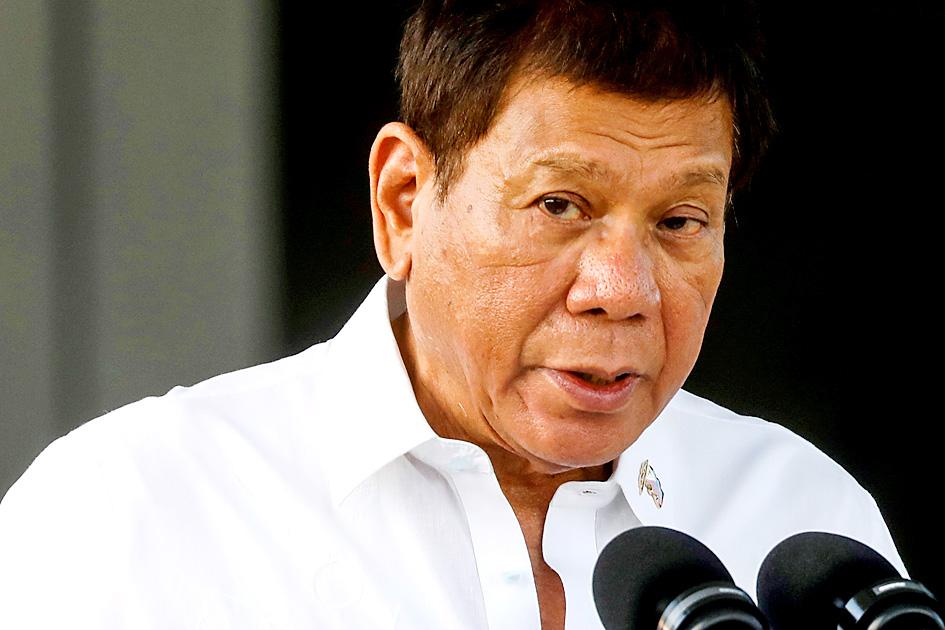Philippine President Rodrigo Duterte has barred his Cabinet from talking about the South China Sea in public, but said the gag order did not mean the country was wavering in its defense of its sovereign rights.
His decision follows weeks of strong rebukes of China by his ministers over the presence of hundreds of fishing vessels in the Philippines’ exclusive economic zone (EEZ), fueling tensions that have gone against Duterte’s policy of rapprochement and non-confrontation with Beijing.
“This is my order now to the Cabinet, and to all and sundry talking for the government, to refrain from discussing the West Philippine Sea with anybody,” Duterte said in a televised address, using the local name for its EEZ. “If we talk, we talk, but just among us.”

Photo: Reuters
Duterte later said that his order should not be construed as weakness and yesterday said that maritime patrols must continue.
“Our agencies have been directed to do what they must and should to protect and defend our nation’s interest,” Duterte said in a statement.
“We will not waver in our position,” Duterte added.
Beijing claims almost the entire South China Sea and has built military installations equipped with missiles on reefs in disputed areas, including within the Philippine EEZ, alongside a constant presence of coast guard and fishing vessels.
The gag order could lessen tensions at the rhetorical level, said Aaron Jed Rabena of the Asia-Pacific Pathways to Progress, a Manila-based think tank.
“It could be that President Duterte has realized that it’s high time for his administration to speak with one voice given the mixed signals ... which show a government that is incoherent,” Rabena said.

Indonesia yesterday began enforcing its newly ratified penal code, replacing a Dutch-era criminal law that had governed the country for more than 80 years and marking a major shift in its legal landscape. Since proclaiming independence in 1945, the Southeast Asian country had continued to operate under a colonial framework widely criticized as outdated and misaligned with Indonesia’s social values. Efforts to revise the code stalled for decades as lawmakers debated how to balance human rights, religious norms and local traditions in the world’s most populous Muslim-majority nation. The 345-page Indonesian Penal Code, known as the KUHP, was passed in 2022. It

‘DISRESPECTFUL’: Katie Miller, the wife of Trump’s most influential adviser, drew ire by posting an image of Greenland in the colors of the US flag, captioning it ‘SOON’ US President Donald Trump on Sunday doubled down on his claim that Greenland should become part of the US, despite calls by the Danish prime minister to stop “threatening” the territory. Washington’s military intervention in Venezuela has reignited fears for Greenland, which Trump has repeatedly said he wants to annex, given its strategic location in the arctic. While aboard Air Force One en route to Washington, Trump reiterated the goal. “We need Greenland from the standpoint of national security, and Denmark is not going to be able to do it,” he said in response to a reporter’s question. “We’ll worry about Greenland in

PERILOUS JOURNEY: Over just a matter of days last month, about 1,600 Afghans who were at risk of perishing due to the cold weather were rescued in the mountains Habibullah set off from his home in western Afghanistan determined to find work in Iran, only for the 15-year-old to freeze to death while walking across the mountainous frontier. “He was forced to go, to bring food for the family,” his mother, Mah Jan, said at her mud home in Ghunjan village. “We have no food to eat, we have no clothes to wear. The house in which I live has no electricity, no water. I have no proper window, nothing to burn for heating,” she added, clutching a photograph of her son. Habibullah was one of at least 18 migrants who died

Russia early yesterday bombarded Ukraine, killing two people in the Kyiv region, authorities said on the eve of a diplomatic summit in France. A nationwide siren was issued just after midnight, while Ukraine’s military said air defenses were operating in several places. In the capital, a private medical facility caught fire as a result of the Russian strikes, killing one person and wounding three others, the State Emergency Service of Kyiv said. It released images of rescuers removing people on stretchers from a gutted building. Another pre-dawn attack on the neighboring city of Fastiv killed one man in his 70s, Kyiv Governor Mykola